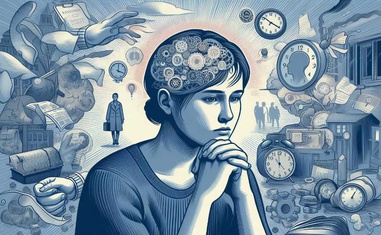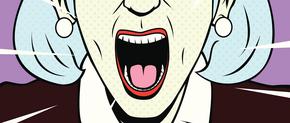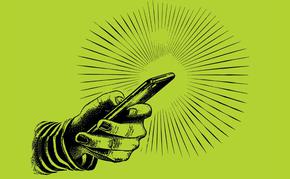The views expressed in our content reflect individual perspectives and do not represent the authoritative views of the Baha'i Faith.
Most people sleep on the same side of the bed each night, wake up around the same time to check their phone, brush their teeth, wash their face, and style their hair in the same order, decide what to wear based on their same handful of favorite outfits, go to work and get stressed out from the same projects or people, determine what they will eat for dinner based on their same list of favorite meals, look forward to winding down in the evening though their familiar routine, only to repeat the same day over and over and over again.
It’s like we’re operating on autopilot as we keep experiencing the same feelings from the same experiences that resulted from the same actions that were created by the same choices that were inspired by the same thoughts. As Abdu’l-Baha, one of the central figures of the Baha’i Faith, said at a talk in Paris in 1911:
His thought is Himself, from which He is inseparable.
And, of the 60,000 to 70,000 thoughts we have in one day, 80 percent of which are negative, “90 percent of those thoughts are exactly the same ones we had the day before,” wrote Dr. Joe Dispenza in his book, “You Are the Placebo: Making Your Mind Matter.” Consequently, “Your yesterday becomes your tomorrow—so in truth, your past is your future.”
So, why is it hard for people to stop living in the past? A principle in neuroscience is that “nerve cells that fire together…wire together.”
RELATED: Harnessing the Power of Thought for Healing
In “What Is Change?” — episode two of his “Rewired” series on Gaia.com — Dr. Joe Dispenza explained that “by the time you’re 35 years old,” you have “a very hardwired set of programs that becomes your identity or personality. And that 35-year-old mark means that most people, by the time they reach that age, become a set of memorized behaviors, unconscious emotional reactions, automatic habits, hardwired attitudes, beliefs, and perceptions that function just like a computer program.”
Perhaps that’s one of the reasons why Abdu’l-Baha stated that “blind imitation of the past will stunt the mind.”
Dr. Joe Dispenza continued, “You can say to a person, ‘Why are you this way?’ And they will say, ‘I am this way because of some experience that happened to me 35 years ago.’ And what they’re saying from [a] biological standpoint [is] that 35 years ago, they had an event that altered them, and they have not been able to change since.”
For example, if kids bullied you in school, you remember their cruel words and smug expressions as they ridiculed and excluded you when you tried to reach out. You felt dejected and lonely when you went home. Every time you remembered and recalled the experience, you felt pain in the present for an event that happened in the past. As the years passed, you became more hopeless and bitter about future relationships. Whenever people were hurtful, and you felt that familiar feeling of rejection and isolation, you reminded yourself of the bullying you experienced at school and the other people in your life who have hurt you, causing you to feel more of those depressing emotions and leaving you in an unhealthy thinking and feeling feedback loop. Moreover, Abdu’l-Baha said that this “thought of our own weakness could only bring despair.”
RELATED: My Path to Forgiveness and Emotional Healing
“Bottom line: Most of us live in the past and resist living in a new future. Why? The body is so habituated to memorizing the chemical records of our past experiences that it grows attached to these emotions,” wrote Dr. Joe Dispenza in “You Are the Placebo.” “In time, we unconsciously become addicted to our problems, our unfavorable circumstances, or our unhealthy relationships.”
People end up becoming addicted to their negative feelings and the rush of the chemicals that flood their bodies as a result, and, eventually, they don’t know who they are without their pain. People may even unconsciously seek out toxic people or situations to trigger their stress response because they have become comfortable with what is unhealthy.
It’s not fair to you to let the cruelty of those in the past still have control over the happiness you can experience in the present and future. In a letter written on behalf of Shoghi Effendi, the Guardian of the Baha’i Faith, in 1943, it says:
Our past is not the thing that matters so much in this world as what we intend to do with our future.
Read my next article to learn how you can stop living in the past and start creating a new and brighter future for yourself.

















Comments
Sign in or create an account
Continue with Facebookor